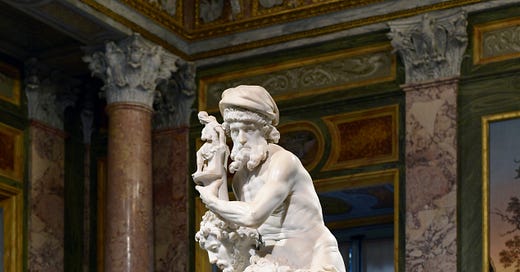$1000 Prize Debate Contest; Patriarchy and the Classical Revival
Something that happens when dudes get old
Fathers and Sons
On Tuesday we welcomed a new baby into our family. Our third child, but the first boy of the bunch. Everyone’s healthy. Thanks to all of you for your support!
It led me to reflect on a tension I’ve seen developing.
I pay a lot of attention to how people are using stories and symbols drawn from Greece and Rome in online popular culture. And there seem to be two conflicting trends:
Young Hoplite Energy - represented by figures like Alcibiades, Heraclitus, Nietzsche; the Xenophon of the Anabasis; Julius Caesar.
This is the perspective that says Modern Life is lame, bureaucratic, effeminate, and tells you to get out there with your War Band and go cause some trouble. Find out what it means to be a Real Man by having high risk adventures, encounters with Strange Women, mercenary operations, etc. The Classics thus inspire you to seek a lost path of excitement.
Paterfamilias Energy - represented by figures like Cicero, Plato, Washington; the Xenophon of the Oeconomicus; Augustus Caesar.
This is the perspective that says a Man’s Special Duty is to Take Responsibility, build things that last, pass on an inheritance to his children and grandchildren, etc. The Classics thus become a source for the principles you want to see instilled into that more permanent legacy.
Young Hoplite energy was essential in sparking the American Revolution;
Paterfamilias energy was essential in nailing down the U.S. Constitution.
Young Hoplite energy dominated the French Revolution, and the campaigns of Napoleon.
It took Paterfamilias energy to unify Germany in the 19th century.
Rome, as a whole, trends Paterfamilias (Aeneas was practically born a Paterfamilias). Greece trends Young Hoplite.
The online right, and the Red Pill space is primarily Young Hoplite; the Classical Education movement is Paterfamilias. (Please multiply examples in the comment section below…)
The Young Hoplite spirit is primarily enjoyed by single, childless men, although King Agesilaus of Sparta exhibited it when he went for his final campaign in Egypt at age 80. Women find it attractive when it succeeds, repellent when it fails, and frustrating when it excludes them.
Paterfamilias energy tends to come to you when you’re a dad. However, it’s not limited to fathers: Washington and Plato had no children - I don’t even think Plato had a wife. But he founded one of the most permanent things ever, in his philosophical school and its traditions.
Women want to end up marrying a Paterfamilias eventually, but don’t want to have a casual fling with someone who reminds them too much of their dad.
Classics has been dominated by the Paterfamilias type since at least the 19th century in Anglophone countries (to the extent that it was led by men; which has not really been the case for a while now).
The truth is, a healthy society, a healthy institution, or even a healthy family life, needs some of both.
But they are in tension, and the conflict between them explains many of the dividing lines in politics now. Balancing the budget, sound money, GDP, are Paterfamilias issues. Economic and technological dynamism, which argue “we can sort out the budget later, it’ll be easy once we conquer/innovate”—this is Young Hoplite. Wars tend to be decided on by the cold, calculating Paterfamilias crowd, but fought by Young Hoplites, who prefer either meaningful narratives or at least the prospect of great immediate rewards (plunder, adventure, Strange Women) over realist geopolitics.
Let me know what you think.
But note, Plutarch offers plenty of fodder for both, and thus the Cost of Glory aims to as well.
The Rostra Debate Contest
For debate to be interesting, it needs to have real stakes.
So we’re setting it at $1000 for this contest.
Background: The Rostra is a new educational operation I’ve started, with the help of some excellent colleagues. The mission is to revive the Classics as a practical discipline of leadership, which for most of history (since antiquity) has been the bulk of its appeal.
Before the 19th century, whenever the Classics were taught, this was done as part of a comprehensive training in Rhetoric—the essential training for forming orators, writers, and statesmen.
The institution of Rhetoric is what gave the West a unique culture of public debate, poetry, journalism, Republican politics, and more. It was an activity that gathered serious people together for gentlemanly intellectual, political, and even scientific exchanges.
This is what we aim to bring back, ultimately, with The Rostra. Specifically, The Rostra is a rhetorical training community. Think Toastmasters, but classical, and better.
In this phase, The Rostra is mostly online. While we’ve been working out the kinks (for nearly two years now), I have kept admission limited to Cost of Glory in-person retreat alumni. But we are now ready to open it up, gradually, to wider audiences.
To kick it off, we’re having a Debate Competition - which also includes a proper course in Classical Rhetoric and Debate methods.
If you’re interested, the entry fee is $400, and which includes 6 weeks of debate sessions and curriculum, as well as 3 months of Rostra membership (a $270 value). The Grand Prize is $1000 off a Cost of Glory program, (such as one of our in-person retreats). Participants will be eligible to join The Rostra permanently afterwards.
I think it’s a killer value.
We start July 7th.
Space is limited, and applications close June 30th. Although we hope to run this again, the price is likely to increase next time.
For more information, and to apply, click here.
Stay Ancient,
Alex
P.S. Here’s a photo of future Young Hoplite, Cost of Glory Junior (“Teddy”):






Congrats to you, Teddy, and your family!
Congratulations on the birth of your son. May you treat your son as the one above treats you. God bless you and your son.